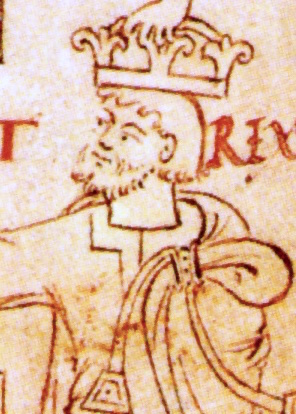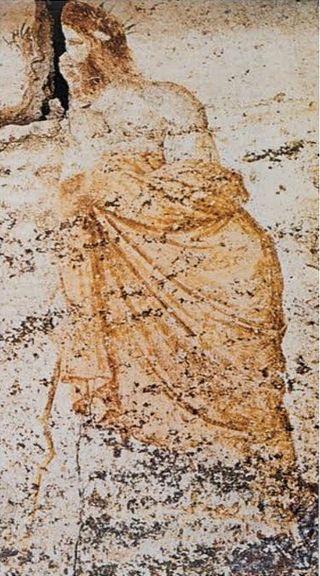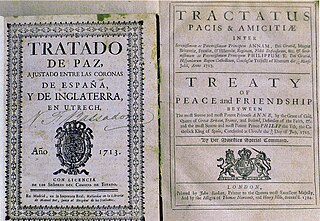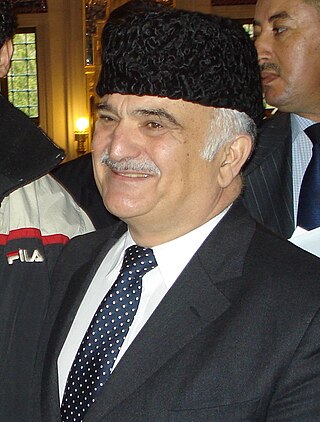See also
- Landfrieden , under the law of the Holy Roman Empire
King's peace or The King's Peace may refer to:

Martin Luther King Jr. was an American Baptist minister and activist who was one of the most prominent leaders in the civil rights movement from 1955 until his assassination in 1968. A Black church leader and a son of early civil rights activist and minister Martin Luther King Sr., King advanced civil rights for people of color in the United States through nonviolence and civil disobedience. Inspired by his Christian beliefs and the nonviolent activism of Mahatma Gandhi, he led targeted, nonviolent resistance against Jim Crow laws and other forms of discrimination in the United States.

Peace is a concept of societal friendship and harmony in the absence of hostility and violence. In a social sense, peace is commonly used to mean a lack of conflict and freedom from fear of violence between individuals or groups.

Pacifism is the opposition or resistance to war, militarism or violence. Pacifists generally reject theories of Just War. The word pacifism was coined by the French peace campaigner Émile Arnaud and adopted by other peace activists at the tenth Universal Peace Congress in Glasgow in 1901. A related term is ahimsa, which is a core philosophy in Indian religions such as Hinduism, Buddhism, and Jainism. While modern connotations are recent, having been explicated since the 19th century, ancient references abound.

Cnut, also known as Cnut the Great and Canute, was King of England from 1016, King of Denmark from 1018, and King of Norway from 1028 until his death in 1035. The three kingdoms united under Cnut's rule are referred to together as the North Sea Empire.

World peace, or peace on Earth, is the concept of an ideal state of peace within and among all people and nations on Planet Earth. Different cultures, religions, philosophies, and organizations have varying concepts on how such a state would come about.

In Greek mythology, Rhadamanthus or Rhadamanthys was a wise king of Crete. As the son of Zeus and Europa he was considered a demigod. He later became one of the judges of the dead and an important figure in Greek mythology.
Antithesis is used in writing or speech either as a proposition that contrasts with or reverses some previously mentioned proposition, or when two opposites are introduced together for contrasting effect. This is based on the logical phrase or term.

The law of war is the component of international law that regulates the conditions for initiating war and the conduct of warring parties. Laws of war define sovereignty and nationhood, states and territories, occupation, and other critical terms of law.

Abdullah II bin Al-Hussein is King of Jordan, having ascended the throne on 7 February 1999. He is a member of the Hashemite dynasty, who have been the reigning royal family of Jordan since 1921, and is considered a 41st-generation direct descendant of the Islamic prophet Muhammad.

The Peace of Utrecht was a series of peace treaties signed by the belligerents in the War of the Spanish Succession, in the Dutch city of Utrecht between April 1713 and February 1715. The war involved three contenders for the vacant throne of Spain, and involved much of Europe for over a decade. The main action saw France as the defender of Spain against a multinational coalition. The war was very expensive and bloody and finally stalemated. Essentially, the treaties allowed Philip V to keep the Spanish throne in return for permanently renouncing his claim to the French throne, along with other necessary guarantees that would ensure that France and Spain should not merge, thus preserving the balance of power in Europe.

Robert Sargent Shriver Jr. was an American diplomat, politician, and activist. As the husband of Eunice Kennedy Shriver, he was part of the Kennedy family. Shriver was the driving force behind the creation of the Peace Corps, and founded the Job Corps, Head Start, VISTA, Upward Bound, and other programs as the architect of the 1960s War on Poverty. He was the Democratic Party's nominee for vice president in the 1972 presidential election.

James VI and I was King of Scotland as James VI from 24 July 1567 and King of England and Ireland as James I from the union of the Scottish and English crowns on 24 March 1603 until his death in 1625. Although he wanted to bring about a closer union, the kingdoms of Scotland and England remained individual sovereign states, with their own parliaments, judiciaries, and laws, both ruled by James in personal union.

David Jude Heyworth Law is an English actor. He received a British Academy Film Award, as well as nominations for two Academy Awards, two Tony Awards, and four Golden Globe Awards. In 2007, he received an Honorary César and was named a knight of the Order of Arts and Letters by the French government.
The legal term peace, sometimes king's peace or queen's peace, is the common-law concept of the maintenance of public order.
Breach of the peace, or disturbing the peace, is a legal term used in constitutional law in English-speaking countries and in a public order sense in the several jurisdictions of the United Kingdom. It is a form of disorderly conduct.
Christ the King is a title of Jesus in Christianity referring to the idea of the Kingdom of God where the Christ is described as seated at the right hand of God.

Prince Hassan bin Talal is a member of the Jordanian royal family who was previously Crown Prince from 1965 to 1999, being removed just three weeks before King Hussein's death. He is now 20th in line to succeed his nephew King Abdullah II.

The Landmark for Peace is a memorial sculpture in Dr. Martin Luther King Jr. Park on the northside of Indianapolis. It honors the contributions of the slain leaders Robert F. Kennedy and Martin Luther King Jr. The memorial, which features Kennedy and King reaching out to each other, was designed and executed by Indiana artist Greg Perry. The bronze portraits were created by Indianapolis sculptor Daniel Edwards.

"No justice, no peace" is a political slogan which originated during protests against acts of ethnic violence against African Americans. Its precise meaning is contested. The slogan was used as early as 1986, following the killing of Michael Griffith by a mob of white youths.